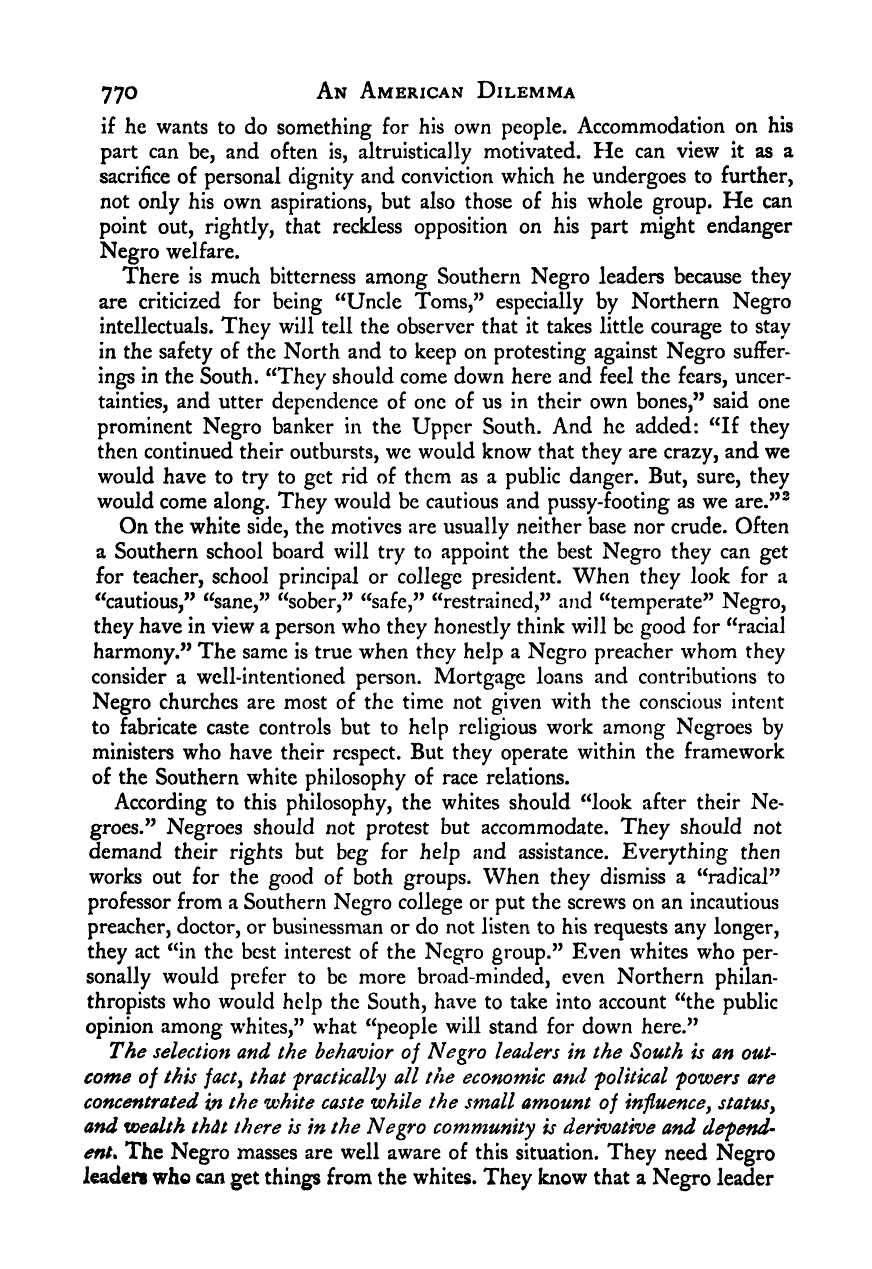Note: Gunnar Myrdal died in 1987, less than 70 years ago. Therefore, this work is protected by copyright, restricting your legal rights to reproduce it. However, you are welcome to view it on screen, as you do now. Read more about copyright.
Full resolution (TIFF) - On this page / på denna sida - IX. Leadership and Concerted Action - 37. Compromise Leadership - 3. Impersonal Motives

<< prev. page << föreg. sida << >> nästa sida >> next page >>
Below is the raw OCR text
from the above scanned image.
Do you see an error? Proofread the page now!
Här nedan syns maskintolkade texten från faksimilbilden ovan.
Ser du något fel? Korrekturläs sidan nu!
This page has never been proofread. / Denna sida har aldrig korrekturlästs.
770 An American Dilemma
if he wants to do something for his own people. Accommodation on his
part can be, and often is, altruistically motivated. He can view it as a
sacrifice of personal dignity and conviction which he undergoes to further,
not only his own aspirations, but also those of his whole group. He can
point out, rightly, that reckless opposition on his part might endanger
Negro welfare.
There is much bitterness among Southern Negro leaders because they
are criticized for being ‘‘Uncle Toms,” especially by Northern Negro
intellectuals. They will tell the observer that it takes little courage to stay
in the safety of the North and to keep on protesting against Negro suffer-
ings in the South. “They should come down here and feel the fears, uncer-
tainties, and utter dependence of one of us in their own bones,” said one
prominent Negro banker in the Upper South. And he added: “If they
then continued their outbursts, we would know that they are crazy, and we
would have to try to get rid of them as a public danger. But, sure, they
would come along. They would be cautious and pussy-footing as we are.”^
On the white side, the motives are usually neither base nor crude. Often
a Southern school board will try to appoint the best Negro they can get
for teacher, school principal or college president. When they look for a
“cautious,” “sane,” “sober,” “safe,” “restrained,” and “temperate” Negro,
they have in view a person who they honestly think will be good for “racial
harmony.” The same is true when they help a Negro preacher whom they
consider a well-intentioned person. Mortgage loans and contributions to
Negro churches are most of the time not given with the conscious intent
to fabricate caste controls but to help religious work among Negroes by
ministers who have their respect. But they operate within the framework
of the Southern white philosophy of race relations.
According to this philosophy, the whites should “look after their Ne-
groes.” Negroes should not protest but accommodate. They should not
demand their rights but beg for help and assistance. Everything then
works out for the good of both groups. When they dismiss a “radical”
professor from a Southern Negro college or put the screws on an incautious
preacher, doctor, or businessman or do not listen to his requests any longer,
they act “in the best interest of the Negro group.” Even whites who per-
sonally would prefer to be more broad-minded, even Northern philan-
thropists who would help the South, have to take into account “the public
opinion among whites,” what “people will stand for down here.”
TAe selection and the behavior of Negro leaders in the South is an out-
come of this facty that practically all the economic and political powers are
concentrated in the white caste while the small amount of influence, status,
and wealth thdt there is in the Negro community is derivative and depend-
ents The Negro masses are well aware of this situation. They need Negro
leaders who can get things from the whites. They know that a Negro leader
<< prev. page << föreg. sida << >> nästa sida >> next page >>